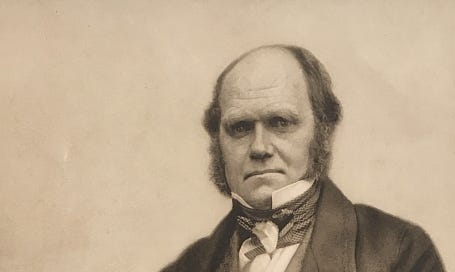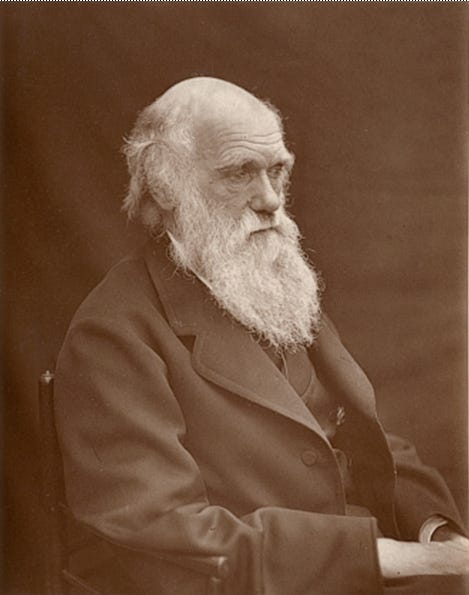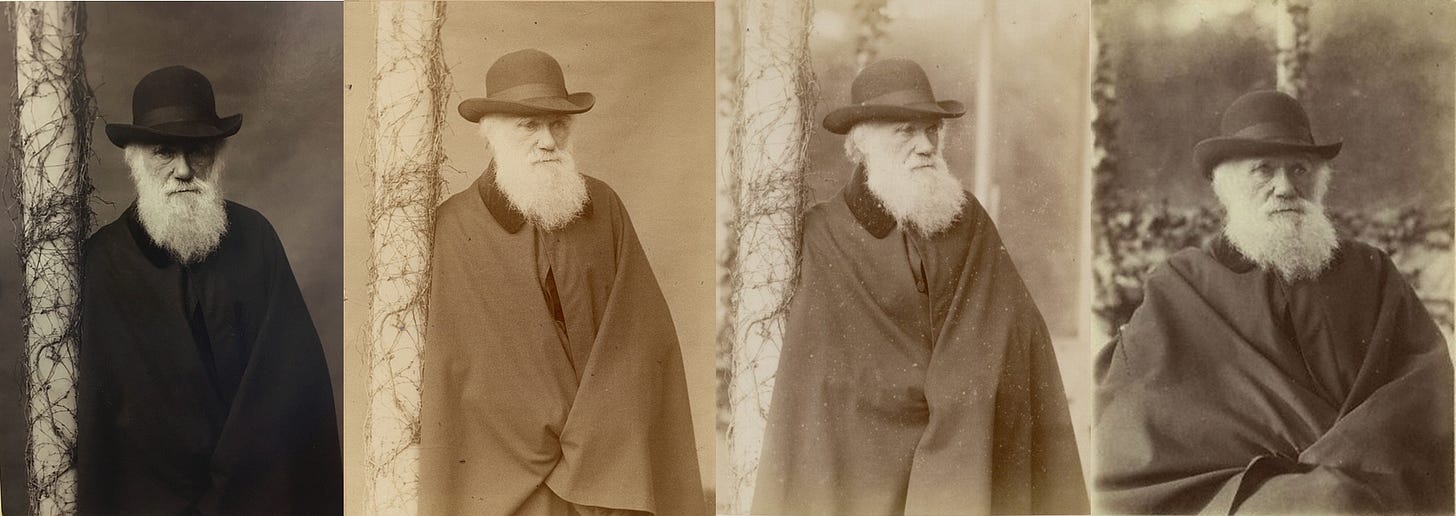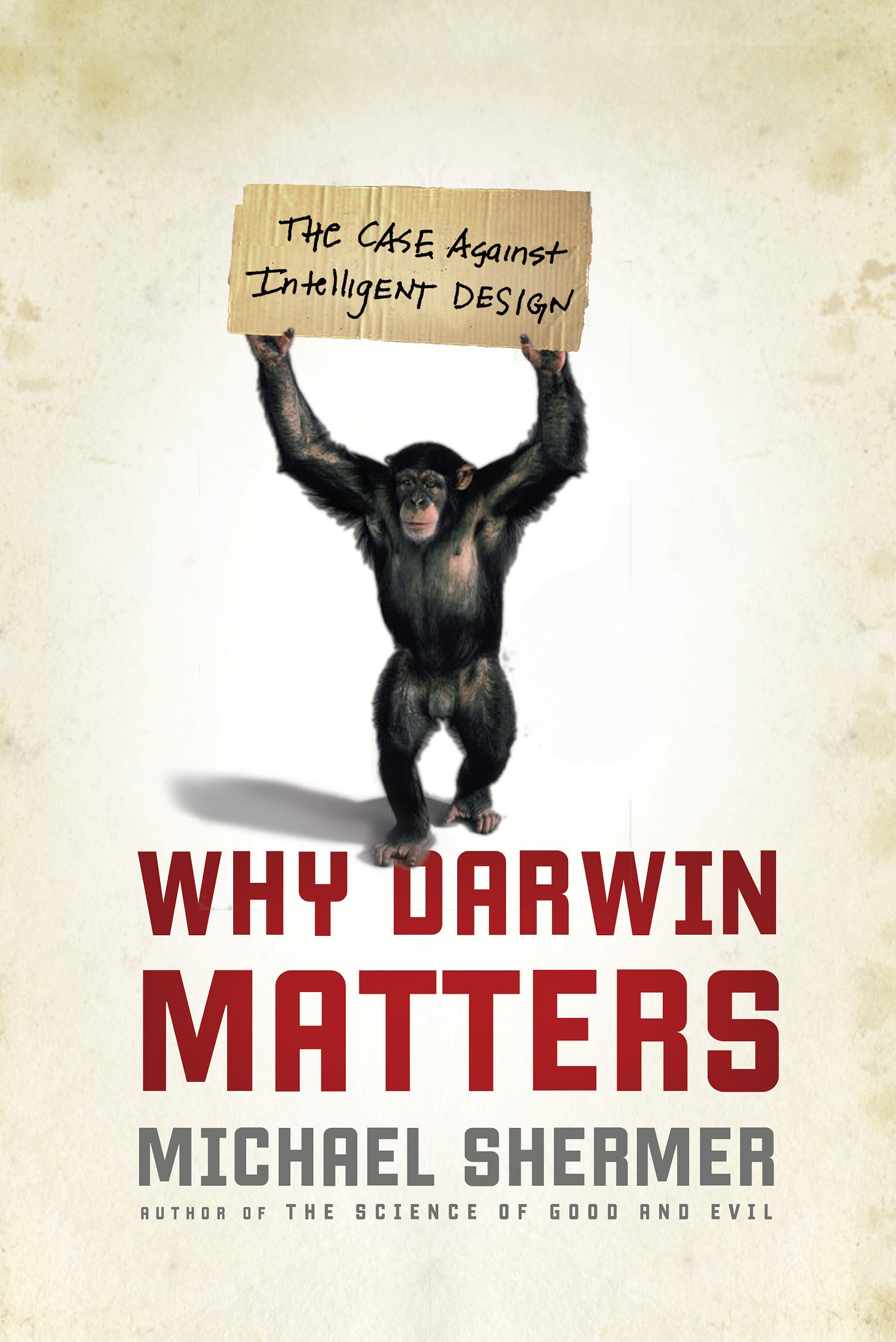Darwin Matters
On the 216th anniversary of Charles Darwin's birth, February 12, 1809, why the sage of Down still matters
“Hence both in space and time, we seem to be brought somewhat near to that great fact—that mystery of mysteries—the first appearance of new beings on this earth.” —Charles Darwin, Journal of Researches, 1845
Today, February 12, 2025, is International Darwin Day, the 216th anniversary of the birth of Charles Darwin, the co-discoverer (along with Alfred Russel Wallace—see my biography In Darwin’s Shadow) of evolution by natural selection, and one of the most influential scientists in history. To honor the sage of Down I have pieced together excerpts from my 2006 book Why Darwin Matters, which attempts to answer the title question (and is my only book cover featuring full frontal nudity). His influence only continues to grow as the years pile up after his death on April 19, 1882 (age 73). (Photographs within courtesy of The Complete Photographs of Darwin by John van Wyhe, part of the Darwin Online project.)
The Myth of Darwin in the Galapagos
In June of 2004, historian of science Frank Sulloway and I began a month-long expedition to retrace Charles Darwin’s footsteps in the Galápagos Islands. The myth Frank set out to investigate years before was that Darwin became an evolutionist in the Galápagos when he discovered natural selection operating on finch beaks and tortoise carapaces, each species uniquely adapted by food type or island ecology. (Photos in this section from the author’s collection.)
The legend endures, Sulloway notes, because of its elegant fit into a Joseph Campbell-like tripartite myth of the hero who (1) leaves home on a great adventure (Darwin’s five-year voyage on the Beagle), (2) endures immeasurable hardship in the quest for noble truths (Darwin suffered seasickness and other maladies), and (3) returns to deliver a deep message (evolution). The myth is ubiquitous, appearing in everything from biology textbooks to travel brochures, the latter of which inveigle potential customers to come walk in the footsteps of Darwin. (See Sulloway’s papers: “Darwin and His Finches: The Evolution of a Legend.” Journal of the History of Biology, 15 (1982):1-53; “Darwin’s Conversion: The Beagle Voyage and Its Aftermath.” Journal of the History of Biology, 15 (1982):325-96; “The Legend of Darwin’s Finches.” Nature, 303 (1983):372; “Darwin and the Galapagos.” Biological Journal of the Linnean Society, 21 (1984):29-59.)
The Darwin Galápagos legend is emblematic of a broader myth that science proceeds by select eureka discoveries followed by sudden revolutionary revelations, where old theories fall before new facts. Not quite. Paradigms power percepts. Nine months after departing the Galápagos, Sulloway discovered, Darwin made the following entry in his ornithological catalogue about his mockingbird collection:
When I see these Islands in sight of each other, & possessed of but a scanty stock of animals, tenanted by these birds, but slightly differing in structure & filling the same place in Nature, I must suspect they are only varieties.
Similar varieties of fixed kinds, not evolution of separate species. Darwin was still a creationist! This explains why Darwin did not even bother to record the island locations of the few finches he collected (and in some cases mislabeled), and why these now-famous birds were never specifically mentioned in the Origin of Species.
Through careful analysis of Darwin’s notes and journals, Sulloway dates Darwin’s acceptance of evolution to the second week of March, 1837, after a meeting Darwin had with the eminent ornithologist John Gould, who had been studying his Galápagos bird specimens. With access to museum ornithological collections from areas of South America that Darwin had not visited, Gould corrected a number of taxonomic errors Darwin had made (such as labeling two finch species a “Wren” and “Icterus”), and pointed out to him that although the land birds in the Galápagos were endemic to the islands, they were notably South American in character.
Darwin left the meeting with Gould, Sulloway concludes, convinced “beyond a doubt that transmutation must be responsible for the presence of similar but distinct species on the different islands of the Galápagos group. The supposedly immutable ‘species barrier’ had finally been broken, at least in Darwin’s own mind.” That July, 1837, Darwin opened his first notebook on Transmutation of Species. By 1844 he was confident enough to write in a letter to his botanist friend and colleague Joseph Hooker:
I was so struck with distribution of Galapagos organisms &c &c, & with the character of the American fossil mammifers &c &c, that I determined to collect blindly every sort of fact which cd bear any way on what are species. At last gleams of light have come, & I am almost convinced, (quite contrary to opinion I started with) that species are not (it is like confessing a murder) immutable.
Like Confessing a Murder
Dramatic words for something as seemingly innocuous as a technical problem in biology: the immutability of species. But it doesn’t take a rocket scientist—or an English naturalist—to understand why the theory on the origin of species by means of natural selection would be so controversial: if new species are created naturally—not supernaturally—what place, then, for God? No wonder Darwin waited twenty years before publishing his theory.
From the time of Plato and Aristotle in ancient Greece to the time of Darwin and Wallace in the nineteenth century, nearly everyone believed that a species retained a fixed and immutable “essence.” A species, in fact, was defined by its very essence—the characteristics that made it like no other species. The theory of evolution by means of natural selection, then, is the theory of how kinds can become other kinds, and that upset not only the scientific cart, but the cultural horse pulling it. The great Harvard evolutionary biologist, Ernst Mayr, stressed just how radical was Darwin’s theory (in his 1982 book Growth of Biological Thought):
The fixed, essentialistic species was the fortress to be stormed and destroyed; once this had been accomplished, evolutionary thinking rushed through the breach like a flood through a break in a dike.
The dike, however, was slow to crumble. Darwin’s close friend, the geologist Charles Lyell, withheld his support for a full nine years, and even then hinted at a providential design behind the whole scheme. The astronomer John Herschel called natural selection the “law of higgledy-piggledy.” And Adam Sedgwick, a geologist and Anglican cleric, proclaimed that natural selection was a moral outrage, and penned this ripping harangue to Darwin:
There is a moral or metaphysical part of nature as well as a physical. A man who denies this is deep in the mire of folly. You have ignored this link; and, if I do not mistake your meaning, you have done your best in one or two cases to break it. Were it possible (which thank God it is not) to break it, humanity, in my mind, would suffer a damage that might brutalize it, and sink the human race into a lower grade of degradation than any into which it has fallen since its written records tell us of its history.
In a review in Macmillan’s Magazine, Henry Fawcett wrote of the great divide surrounding On the Origin of Species:
No scientific work that has been published within this century has excited so much general curiosity as the treatise of Mr. Darwin. It has for a time divided the scientific world with two great contending sections. A Darwinite and an anti-Darwinite are now the badges of opposed scientific parties.
Darwinites and anti-Darwinites. Although the scientific community is now united in agreement that evolution happened, a century and a half later the cultural world is still so divided. According to a 2005 poll by the Pew Research Center: 42 percent of Americans hold strict creationist views that “living things have existed in their present form since the beginning of time” while 48 percent believe that humans “evolved over time.” More to the point of why evolution has been in the news of late, the survey also found that 64 percent said they were open to the idea of teaching creationism in addition to evolution in public schools, while 38 percent said they think evolution should be replaced by creationism in biology classrooms. (Recent polls find the acceptance of the theory of evolution in the US increasing and creationism decreasing, but a 54% acceptance rate for the theory is not exactly a mandate for science.)
1878a Three-quarter right profile, seated in a Down House chair (according to some sources), by Leonard Darwin.
Why Evolution Matters
The influence of the theory of evolution on the general culture is so pervasive it can be summed up in a single observation: we live in the age of Darwin. Arguably the most culturally jarring theory in the history of science, the Darwinian revolution changed both science and culture in ways immeasurable, as Ernst Mayr summarized (in my own wording):
1. The static creationist model of species as fixed types, replaced with a fluid evolutionary model of species as ever-changing entities.
2. The theory of top-down intelligent design through a supernatural force, replaced with the theory of bottom-up natural design through natural forces.
3. The anthropocentric view of humans as special creations above all others, replaced with the view of humans as just another animal species.
4. The view of life and the cosmos as having design, direction, and purpose from above, replaced with the view of the world as the product of bottom-up design through necessitating laws of nature and contingent events of history.
5. The view that human nature is infinitely malleable and primarily good, replaced with the view of a constraining human nature in which we are good and evil.
In the memorable observation by Theodosius Dobzhansky: “Nothing in biology makes sense except in the light of evolution.”
1881 Four photographs by Elliott & Fry. This well-known sitting includes the only known photographs of Darwin standing.
Darwin’s God and the Devil’s Chaplain
Darwin matriculated at Cambridge University in theology, but he did so only after abandoning his medical studies at the Edinburgh University because of his distaste for the barbarity of surgery. Darwin’s famous grandfather Erasmus, and his father Robert, both physicians by trade who were deeply schooled in natural history, were also confirmed freethinkers, so there was no doctrinaire pressure on the young Charles to choose theology.
In point of fact, Darwin’s selection of theology as his primary course of study allowed him to pursue his passion of natural history through the academic justification of studying “natural theology”—he was far more interested in God’s works (nature) than God’s words (the Bible). Besides, theology was one of only a handful of professions that a gentleman of the Darwin family’s high social position in the landed gentry of British society could choose. Finally, although Darwin belonged to the Church of England, membership was expected of someone in his social class.
Still, Darwin’s religiosity was not entirely utilitarian. He began and ended his five-year voyage around the world as a creationist, and he regularly attended services on board the Beagle, and even during some land excursions in South America. It was only upon his return home that his loss of his faith came about, that that loss happened gradually—even reluctantly—over many years.
Nagging doubts about the nature and existence of the deity chipped away at his faith from his studies of the natural world, particularly the cruel nature of many predator-prey relationships. “What a book a Devil’s Chaplain might write on the clumsy, wasteful, blundering low & horridly cruel works of nature!” Darwin harped in an 1856 letter to his botanist mentor Joseph Hooker. In 1860 he wrote to his American colleague, the Harvard biologist Asa Gray, about a species of wasp that paralyzes its prey (but does not kill it), then lays its eggs inside the paralyzed insect so that upon birth its offspring can feed on live flesh:
I cannot persuade myself that a beneficent God would have designedly created the Ichneumonidae with the express intention of their feeding within the living bodies of Caterpillars, or that a cat should play with mice. Not believing this, I see no necessity in the belief that the eye was expressly designed.
Pain and evil in the human world made Darwin doubt even more. “That there is much suffering in the world no one disputes,” he wrote to a correspondent. “Some have attempted to explain this with reference to man by imagining that it serves for his moral improvement. But the number of men in the world is as nothing compared with that of all other sentient beings, and they often suffer greatly without any moral improvement.” Which is more likely, that pain and evil are the result of an all-powerful and good God, or the product of uncaring natural forces? “The presence of much suffering agrees well with the view that all organic beings have been developed through variation and natural selection.” The death of Darwin’s beloved ten-year-old daughter Anne put an end to whatever confidence he had in God’s benevolence, omniscience, and thus existence. According to the great Darwin scholar and biographer Janet Browne: “This death was the formal beginning of Darwin’s conscious dissociation from believing in the traditional figure of God.”
Throughout most of his professional career, however, Darwin eschewed the God question entirely, choosing to focus instead on his scientific studies. Toward the end of his life Darwin received many letters querying him on his religious attitudes. His long-silence gave way to a few revelations. In one letter penned in 1879, just three years before he died, Darwin explained: “In my most extreme fluctuations I have never been an Atheist in the sense of denying the existence of God. I think that generally (and more and more as I grow older), but not always, that an Agnostic would be the more correct description of my state of mind.”
A year later, in 1880, Darwin clarified his reasoning to the British socialist Edward Aveling, who solicited Darwin’s endorsement of a group of radical atheists by asking his permission to dedicate a book Aveling edited entitled The Student’s Darwin, a collection of articles discussing the implications of evolutionary theory for religious thought. The book had a militant antireligious flavor that Darwin disdained and he declined the offer, elaborating his reason with his usual flare for quotable maxims:
It appears to me (whether rightly or wrongly) that direct arguments against christianity & theism produce hardly any effect on the public; & freedom of thought is best promoted by the gradual illumination of men’s minds which follow[s] from the advance of science. It has, therefore, been always my object to avoid writing on religion, & I have confined myself to science.
Darwin then appended an additional hint about a personal motive: “I may, however, have been unduly biased by the pain which it would give some members of my family, if I aided in any way direct attacks on religion.” Darwin’s wife Emma was a deeply religious woman, so out of respect for her he kept the public side of his religious skepticism in check, an admirable feat of self-discipline by a man of high moral character.
Why Darwin Matters
As pattern-seeking, storytelling primates, to most of us the pattern of life and the universe indicates design. For countless millennia we have taken these patterns and constructed stories about how life and the cosmos were designed specifically for us from above. For the past few centuries, however, science has presented us with a viable alternative in which the design comes from below through the direction of built-in self-organizing principles of emergence and complexity. Perhaps this natural process, like the other natural forces of which we are all comfortable accepting as non-threatening to religion, was God’s way of creating life. Maybe God is the laws of nature—or even nature itself—but this is a theological supposition, not a scientific one.
What science tells us is that we are but one among hundreds of millions of species that evolved over the course of three and a half billion years on one tiny planet among many orbiting an ordinary star, itself one of possibly billions of solar systems in an ordinary galaxy that contains hundreds of billions of stars, itself located in a cluster of galaxies not so different from millions of other galaxy clusters, themselves whirling away from one another in an expanding cosmic bubble universe that very possibly is only one among a near infinite number of bubble universes. Is it really possible that this entire cosmological multiverse was designed and exists for one tiny subgroup of a single species on one planet in a lone galaxy in that solitary bubble universe? It seems unlikely.
Herein lies the spiritual side of science—sciencuality, if you will pardon an awkward neologism but one that echoes the sensuality of discovery. If religion and spirituality are suppose to generate awe and humility in the face of the creator, what could be more awesome and humbling than the deep space discovered by Hubble and the cosmologists, and the deep time discovered by Darwin and the evolutionists?
Darwin matters because evolution matters; evolution matters because science matters. Science matters because it is the preeminent story of our age, an epic saga about who we are, where we came from, and where we are going.
###
Michael Shermer is the Publisher of Skeptic magazine, the host of The Michael Shermer Show, and a Presidential Fellow at Chapman University. His many books include Why People Believe Weird Things, The Science of Good and Evil, The Believing Brain, The Moral Arc, and Heavens on Earth. His new book is Conspiracy: Why the Rational Believe the Irrational. This essay was based, in part, on Why Darwin Matters: The Case Against Intelligent Design.















Thank you for the wonderful essay. I thoroughly enjoyed it, as usual.
Interestingly, although it’s generally agreed that Darwin came upon the essence of his theory in 1837-1838, a perennial question is why he waited until 1859 to publish the Origin. Of the many answers that have been offered, one is particularly amenable to close historical scrutiny: the fact that he could not explain to his own satisfaction the evolution of what he called the "wonderful instincts" of the social insects… which included slave-making by some ant species and hive building by the honey bees.
I’ve appended a link to a paper in which I argue for the latter — the well-known but misunderstood natural history of the honey bees was, indeed, one of the forces that stayed Darwin’s hand.
https://drive.google.com/file/d/1uRxIvEARioIN3bPzcyjb9MQ99TGV0y-a/view?usp=share_link
Thank you again for a great essay!
The immutability of species is a paper tiger set up by evolutionists to destroy creationist arguments whereas modern creationists point out how that is not the Biblical position. The Bible speaks of kinds of animals, not species. Hence within a kind can be say dog kinds from the huge variety of domestic dogs to wolves. ....all derived from a starting large genetic pool of dog/,wolf kind to refined end points, the refining done by the environment or man. Kinds have their limits though. Darwin enjoyed breeding unusual pigeon varieties but never turned them into anything else such as small hawks other than....pigeons. And the finches on Galapagos have trended back to a more uniform beak form in response to food type changes. Epigenetic?